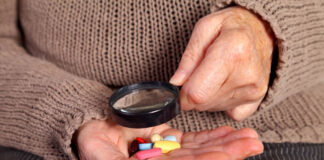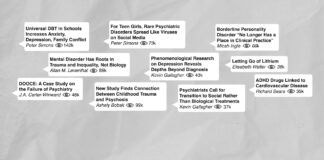Tag: lithium
Psychiatric Drugs “A Crude Form of Chemical Restraint”
Mental health nursing has a key role to play in helping people discontinue the drugs, writes Timothy Wand.
Lithium Doubles Risk of Thyroid and Kidney Dysfunction
Serum lithium levels lower than those considered therapeutic still conveyed increased risk.
Desperate Measures: Ghaemi’s Response to Our Review of Lithium and Suicide...
Ghaemi’s article is more of a rant than a scientific commentary.
Mad in America’s 10 Most Popular Articles in 2023
A roundup of Mad in America's most read blogs and personal stories of 2023 as chosen by our readers.
Letting Go of Lithium
The healing journey is less about being free from medication and psychiatry and more about connecting with myself now. I am grateful for the freedom to feel.
Lithium Use Leads to Chronic Kidney Disease
New evidence suggests that lithium, commonly prescribed for bipolar disorder, can increase the risk of chronic kidney disease.
Lithium, Antidepressants, Esketamine—All No Better Than Placebo?
Peter Simons covers a clinical trial that found lithium ineffective at preventing suicide attempts, an essay by Allen Frances on the overdiagnosis of depression and overprescription of antidepressants, a review of the ineffectiveness and dangers of antidepressants, and an analysis that revealed that esketamine failed five of its six clinical trials.
Lithium No Better Than Placebo for Preventing Suicide Attempts
A trial in veterans who had survived a previous suicide attempt was stopped early because the drug was found to be no better than a placebo.
Mental Health Survival Kit, Chapter 2: Is Psychiatry Evidence Based? (Part...
Schools and hospitals have become dangerous places for children and adolescents. They should stimulate children, not pacify them with speed on prescription.
Neuropsychological Tests Reveal Consequences of Polypharmacy
Neuropsychological assessments reveal the cognitive, occupational, and social impact of polypharmacy in psychiatry.
In Memory of Julie Greene
With deep regret, Mad in America announces another loss in our contributor community. Julie C. Greene, writer and antipsychiatry advocate, lost her battle with kidney disease on November 29 at her home in Beaver Falls, Pennsylvania. Julie had been an MIA blogger since 2014, including several pieces on the dangers of lithium.
People Diagnosed with Bipolar Disorder at Increased Risk for Parkinson’s
Increased Parkinson's risk could be related to lithium, antipsychotic, and antiepileptic drug use.
Lithium Toxicity and an Almost-Human Hospital
Lithium is a notoriously toxic substance, and if it isn’t managed carefully enough, can have some very nasty effects. I discovered this the hard way. It got to the point where I could barely eat or drink or walk around. Yet lithium never made a dent — not for a single moment — in what was going on in my head.
Lithium: A Survivor’s Guide for Parents
When I was a young adult, I was misdiagnosed with bipolar disorder and placed on lithium. I am 61 years old now, living on the edge of end-stage kidney disease. If I could undo everything, by all means, I would not have taken this drug. It is not safe for anyone at any age.
The $3 Billion Research Breakdown
In this piece for Medscape, Jodi S. Cohen chronicles the research malpractice case of child psychiatrist Mani Pavuluri, who put vulnerable children at serious risk...
Lithium
In this piece for Healing Journey, Anne O'Beirne briefly summarizes the history of the medical usage of lithium and describes the impact that the drug has...
Little Porcupine Goes to the Psych Ward
I was so anxious about having to raise three boys alone that I felt I was going insane. So I thought of going to see a psychiatrist. I was looking for Carl Jung. Instead I found a system where they give you pills, whether you need them or not.
Antidepressants Increase the Risk of Suicide and Violence at All Ages
Although the drug industry, our drug regulators and leading psychiatrists have done what they could to obscure these facts, it can no longer be doubted that antidepressants are dangerous and can cause suicide and homicide at any age.
Pills That Steal Generations of Lives
Suddenly I had an insight into why my dad decided to end his life in 1976. I learned that, like me, he was on antidepressant medication. It seems highly likely that his illness could have been entirely caused by side effects of medication, just like it was with me.
Off Psychiatric Drugs After Fourteen Years
I have hopes for the field of psychiatry. I hope the field will redeem itself, and redeem its practitioners, because they do have clinical skill and the opportunity to learn more and grow. Many of them, I believe, were just taught bad science, influenced and infiltrated by Big Pharma.
Consequences of Taking the Yellow Brick Road: Lithium Carbonate 1984-1996
I was first given Lithium Carbonate in the spring of 1984, and I was taken off Lithium by my attending physician in 1996, but left on other drugs. It took me until 2012 to realize psychiatry is a sham. So often people tell me, “I don’t care what my life is like ten years from now. I only want to feel good now.” I may have said the same thing twenty years ago. Now I have the hindsight to know that my viewpoint back then was juvenile at best. I try to warn other patients these days. It’s hard to joke around about something that kills people.
A Moment Passed Too Often
What if, in that moment, nothing happened? What if I was given a second to collect myself enough to engage in the conversation surrounding my future? No one asked me what I would like to do. I was never given the chance to regain my equilibrium before I was drugged and bagged for the next decade.
The FDA Is Hiding Reports Linking Psych Drugs to Homicides
In my wildest dreams, I could never have imagined being drawn into a story of intrigue involving my own government’s efforts to hide, from the public, reports of psychiatric drugs associated with cases of murder, including homicides committed by youth on the drugs. But that is precisely the intrigue I now find myself enmeshed in.
Organized Denial: Psychiatry’s Quiet Desperation
Peter Gøtzsche’s new book, Deadly Psychiatry and Organized Denial brings up an important and complex issue. How do psychiatrists get up in the morning and damage people all day long while pretending to help them? The book is elegantly referenced – and I encourage everyone who practices thoughtful psychiatry to read it, because you need to be much better educated to practice high-quality mental health than you do to act as a dispensing machine. Gøtzsche is absolutely right; on all levels psychiatrists are in denial about the damage that they are doing to patients.
Lithium and Suicide: What Does the Evidence Show?
There appears to be increasing acceptance of the idea that lithium prevents suicide, and even that it can reduce mortality rates. For a toxic drug that makes most people feel rather depressed, this seems curious. I did wonder whether it might be having this effect on suicide by sapping people of the will to act, but the proposed effect on mortality seems completely inexplicable. A closer look at the evidence, however, suggests the idea is simply not justified.






























